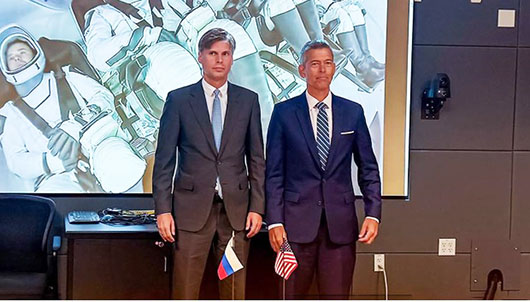Special to CosmicTribune.com, August 6, 2025
By Richard Fisher
The roller coaster of United States-Russia relations hit a dangerous curve this past week, making curious Russia’s simultaneous public gesture that it desires continued space cooperation with the Washington.
President Donald Trump campaigned promising to seek an early end to Russia’s horrific war against Ukraine an at some personal political expense made numerous gestures to Russian dictator Vladimir Putin.

Subsequently, he tried to initiate negotiations with Russia toward ending its war, only to face up to the reality of Putin’s recalcitrance, and more recently to trade nuclear threats with former Russian President and current Deputy Chairman of the Russian National Security Council Dmitry Medvedev.
Expressing his frustration, on July 29 Trump said that Russia had “10 days from today” to reach a ceasefire in its war or be hit with tariffs against its oil industry, including against those who purchase its oil — which include China and India.
Medvedev then responded on Russian social media Telegram that Trump’s statements affirmed Russia path, saying “…then Russia is doing everything right and will continue to proceed along its own path,” and then remarked ominously that Trump should remember “how dangerous the fabled ‘Dead Hand’ can be.”
Dead Hand is a Soviet Cold War-era nuclear control system that automatically ensures a massive nuclear strike during or after a nuclear attack.
But this statement by Medvedev prompted Trump to announce on Aug. 1 that “I have ordered two Nuclear Submarines to be positioned in the appropriate regions, just in case these foolish and inflammatory statements are more than just that.”
One might assess that the U.S.-Russian space relationship, now centered on maintaining and using the International Space Station (ISS), was similarly fragile, but this past week saw a rare gesture — the first since 2018 — a visit to the U.S. by a Russian space agency Roscosmos director, currently Dmitry Bakanov.
Appointed to this position in February at age 39, Bakanov was most recently Deputy Minister of Transportation, has worked in the information technology industry, speaks fluent English and strikes a refreshing contrast with his bombastic predecessor Dmitry Rogozin.
Despite the ominous Trump-Medvedev exchange, it is noteworthy that Putin did not recall Bakanov, who arrived in Houston on July 31 to meet with Sean Duffy, Acting Administrator of the National Aeronautics and Space Administration (NASA).
While in Houston Bakanov also met with Russian Cosmonaut Oleg Platanov, who was due to ride on a SpaceX Dragon spaceship mission to take a new crew to the ISS.
While barely noted in the U.S. press, the Bakanov-Duffy meeting received generous coverage in the Russian state media.
TASS reported on July 31, that Bakanov stated, “The conversation went well. We agreed that we will operate the ISS until 2028… and we will work on the issue of de-orbiting it by 2030.”
Full Text . . . . Current Edition . . . . Subscription Information

You must be logged in to post a comment Login